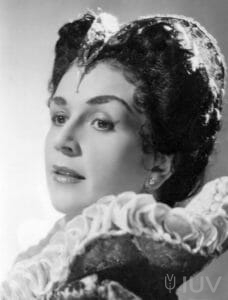Andriy Hnatyshyn (1906, Chyzhykiv, Lviv region – 1955, Vienna) was a world-famous Ukrainian composer, conductor, musical and public figure, teacher, professor, publicist, actor and singer. He was one of the biggest and most prominent representatives of the Ukrainian diaspora in Vienna, who popularized Ukrainian culture and music abroad all his life. He was a true legend in the music world, revered and famous in other countries and almost unknown in his native land. Until recently, unfortunately, until recently Ukraine did not know or hear about Andriy Hnatyshyn. Only in recent decades this legendary Ukrainian has finally been mentioned in his homeland.
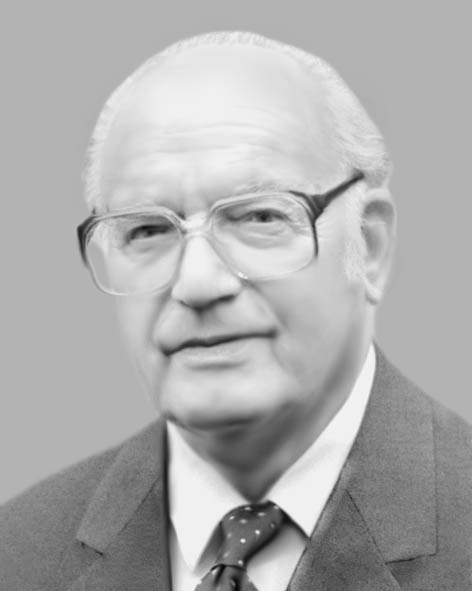
Photo: https://zbruc.eu/node/60482
Andriy Hnatyshyn – young composer and conductor of village choirs
Andriy was born in the village of Chyzhykiv in the Lviv region. At first he studied at a public school and already at such a young age began to show a talent for music. The village teacher, noticing the outstanding musical abilities of the guy, convinced his parents to send Andriy to study at the academic gymnasium in Lviv. The boy immediately became a soloist in the gymnasium mixed choir under the direction of Yaroslav Witoshynsky and later even headed the men’s gymnasium choir. During the holidays he also led a mixed choir in his native village. Moreover, during the gymnasium years, the young man first tried himself as a composer. At such a young age, he already wrote his first song, or rather music to the words of Taras Shevchenko “За думою дума” (eng. “Behind the Duma Duma”) for the male choir.
After graduating from the gymnasium in 1928, he studied philosophy and theology at the Lviv Theological Academy. But the young man still could not imagine his life without music, so two years later he became a student at the pedagogical faculty of the Lysenko Higher Music Institute in Lviv. There he studied under the guidance of composer Stanislav Liudkevych, composer and pianist Nestor Nyzhankivsky, composer and musicologist Borys Kudryk. The latter had a significant influence on the young musician and even gave him private lessons in harmony and counterpoint.
In his student years, Andriy Hnatyshyn, in addition to music, was also engaged in social activities, in particular, he was a cultural referent of the Ukrainian public organization “Просвіта” (eng. “Prosvita”) in the Lviv region. He took care of the dissemination of education among the peasants, helped in organizing readings and at the same time headed the choir, and not only in his native Chyzhykiv, but also in some other Galician villages: Myklashiv, Vynnyky, Pidsosnov, Pidberezivtsi, Zapytiv, Zashkiv. It was the work in the Zashkiv choir that became a landmark for the young conductor.
The performance of the choir from Zashkiv in the Craft Chamber impressed then Lviv Metropolitan Andriy Sheptytsky. Although various choirs performed in front of him, Hnatyshyn’s choir was liked the most. The Metropolitan was delighted with the talented conductor and in 1931 awarded Andriy Hnatyshyn a scholarship to study the art of composition and conducting at the New Vienna Conservatory.
Related people
Andriy Hnatyshyn – choir activity in Vienna, performances in Hofburg
At the age of 25, the talented conductor moved to Vienna. There in 1931 he successfully graduated from the Vienna University of Music and Performing Arts and received a diploma of bandmaster.
His life and work in Vienna, first of all, was connected with the choir of the Ukrainian Greek Catholic Church of St. Barbara, which Andriy Hnatyshyn (albeit intermittently) headed for 64 years! It was under his leadership that this choir became one of the best Ukrainian choirs in Europe and performed Ukrainian folk and religious songs in the largest cathedrals and concert halls of Vienna, Rome, Munich, Salzburg, Graz popularizing Ukrainian music in radio and television. And thanks to a prominent I=Ukrainian, St. Barbara’s Church became the center of Ukrainian culture in Austria. Hnatyshyn himself said that he wanted to
show our musical culture, both church and secular to foreigners living in Austria and to the wider worlds and thus make a good name for our Ukrainian people and instill sympathy.
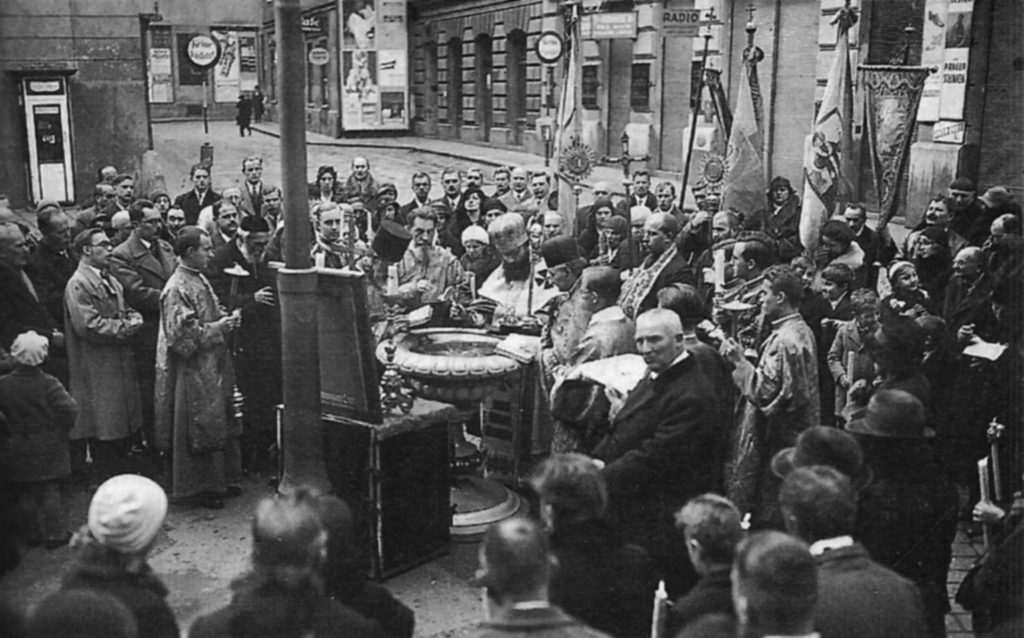
The Ukrainian choir with Andriy Hnatyshyn (third from the left) sings at the Water Consecration in front of St. Barbara’s Church in Vienna, 1933. Photo: Zbruch
The church and secular choirs of Andriy Hnatyshyn participated in all cultural events organized by the Ukrainian diaspora in Vienna: Shevchenko concerts, concerts in honor of Ivan Franko, Markiyan Shashkevych, Lesya Ukrainka, Cardinal Josyf Slipyj in the hall of the Italian Cultural Institute, Metropolitan Andriy Sheptytsky on the occasion of the 100th anniversary of the “Січ” (eng. “Sich”) Academic Society in Vienna and others. In addition to music and singing, these events featured presentations on the works of prominent Ukrainian composers by Andriy Hnatyshyn.
The choir of St. Barbara’s Church performed brilliantly with Ukrainian opera singer Mykhailo Starytsky in the Mozart Hall on the occasion of the St. Barbara’s Brotherhood. Other noteworthy performances include a spiritual concert of Slavic music in Salzburg in honor of the International Cyril and Methodius Congress (1963), in the Brahms Hall in Vienna with the famous opera legend Ira Malaniuk, and at a concert in the Vienna Conservatory on May 8, 1971, where the choir performed Sunday songs and psalms, hymns and folk songs.
Since 1974, this choir, led by Hnatyshyn, has been a regular participant in the world-famous Vienna Festival. In 1980, they were invited to give a concert at the residence of Austrian President Rudolf Kirschläger in Hofburg. Another landmark performance in the basilica was that of a combined Ukrainian choir (600 people) from Europe, the United States, and Canada during the papal service in honor of the millennium of the baptism of Kyivan Rus (1988). The choir was conducted, of course, by Andriy Hnatyshyn.
The musical and educational activities of the Ukrainian composer and conductor are associated not only with Austria, but also with the United States of America (Cleveland, Detroit, Chicago, Philadelphia, Newark) and Canada (Edmonton, Toronto) where his concerts were a great success.
You can listen to the works of Andriy Hnatyshyn on the website parafia.org.ua.
“Viennese” church music on records and diaspora education
Andriy Hnatyshyn not only made a huge contribution to the development and popularization of Ukrainian music but also took care of its preservation and perpetuation. He recorded the choir’s performances together with the pastor Volodymyr Havlich of St. Barbara’s Church. The records were released in Austria, United States and the Vatican. In total, about 300 pieces of Ukrainian church and secular music were recorded. This recording was often broadcast by various radio stations with Ukrainian-language programs. The record could be ordered by mail and soon it spread to all continents and became widely known in the Ukrainian diaspora as the “Viennese” Divine Liturgy.
The Ukrainian-language Holy Liturgy and Vespers, Sunday Matins, Church and Folk Songs of Ukraine, Sunday Songs and Hayivky, Ukrainian Carols, and Carols of the Slavic Nations were often heard on Austrian radio. Radio programs were broadcasted throughout Europe, including pro-Soviet Ukraine. They were spreading the information about the rites of the Ukrainian church, the customs of our people and their art.
After appearing on the radio, the choir was featured in newspapers and invited to sing in various Austrian churches including the central St. Stephen’s Cathedral. Hnatyshyn was invited as a conductor by Austrian churches to perform services. Hnatyshyn wrote:
It was February 5, 1961, a historic date, when Austrian theologians sang a Ukrainian service for the first time under the direction of a Ukrainian conductor.
When the Second World War broke out, the work of the choir of St. Barbara’s church was put on hold. Andriy Hnatyshyn lived and worked for some time in Berlin, where he was a singer and regent in the Ukrainian church choir. After the war ended and he returned to Vienna, he became the conductor of the choirs of the Serbian and Russian churches.
Andriy Hnatyshyn - educator and public figure
Andriy Hnatyshyn also fulfilled himself as a teacher, in particular, he gave private lessons in singing and piano. In 1947, he received Austrian citizenship and together with his friend Kapellmeister Heinz Hauptmann created the “Нову студію співу” (eng. “New Singing Studio”) where they used sound recordings to teach the correct development and posture of the voice.
Andriy Hnatyshyn’s musical activity was often combined with public education. He was a cultural advisor to the Ukrainian National Association (UNO) and organized concerts in large music halls in Vienna. In addition, he was actively involved in public activities in the Ukrainian societies “Січ” (eng. “Sich”), “Родина” (eng. “Family”), “Громада” (eng. “Hromada”) and “Єдність” (eng. “Unity”) which had their own publications.
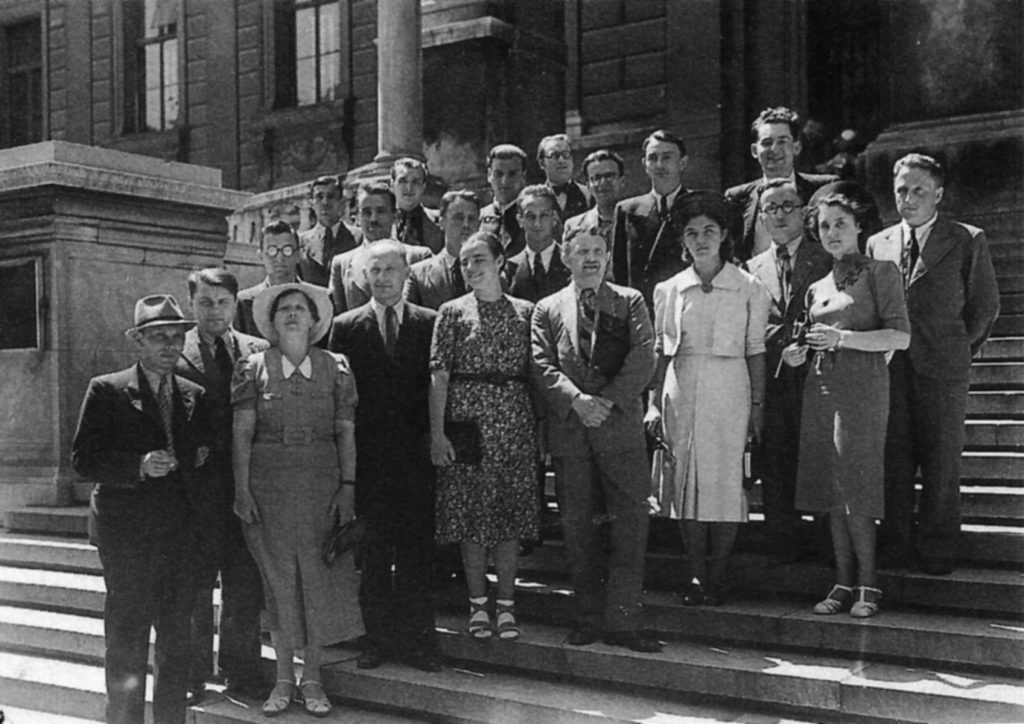
Andriy Hnatyshyn (first from the right in the last row) with the Ukrainian “Січ” (eng. “Sich” ) Society, Vienna, 1939. Photo: Zbruch
Publishing and journalistic activities also did not pass over the talented Ukrainian. At one time he got a job at Borys Tyshchenko’s publishing house where together with Bohdan Veselovsky he processed sheet music and prepared a series of Ukrainian folk songs for publication. Andriy Hnatyshyn also frequently published critical articles and reviews in the press, including the Lviv-based magazine “Українська Музика” (eng. “Ukrainian Music”) and diaspora magazines “Українське слово” (eng. “Ukrainian Word”), “Свобода” (eng. “Freedom”), “Християнський голос” (eng. “Christian Voice”) and “Шлях перемоги” (eng. “Way of Victory”). He focused on the musical and educational activities of Ukrainian performers in the diaspora: opera singer Iryna Malaniuk, pianist Daria Karanovych (later director of the Ukrainian Music Institute in Newark, USA), cellist Bohdan Berezhnytsky, violinist Wilhelm Baran and others. All of them participated in concerts of the St. Barbara Brotherhood in Vienna, promoting Ukrainian music and performing works by Ukrainian composers.
Andriy Hnatyshyn - well-known in Austria and not so much at home. Testament for Kyiv
Already known in Austria, the talented Ukrainian Andriy Hnatyshyn tried his hand at filmmaking. He played the role of a French officer in the 1930s film “Opernball” (1939). By the way, the modern Ukrainian diaspora has renewed the tradition, and since 2015 the Ukrainian Charity Ball has been held annually in Vienna. During the Second World War the artist was a member of the creative team of the film “Homecoming” (Heimkehr, 1941), recruiting extras and inviting primarily Ukrainian students.
In 1963, the President of Austria honored Andriy Hnatyshyn with the title of professor for his great achievements in music education and creative activity. That same year the composer married a choir singer, Yevhenia Moroz, also of Ukrainian descent. From an early age the parents fostered love and respect for the native Ukrainian language and culture in their three children – son Ihor and daughters Vira and Liubov.
His name, as a contemporary composer, constantly appeared in Austrian music encyclopedias and reference books. He had long been known both in Austria and abroad, but his music was heard in his homeland only on the eve of independence. Toward the end of his life he finally managed to return to Ukraine, to see his elderly mother and perform in his native land: in 1990 he gave a concert at the Lviv Opera House, and in 1994 at the Kyiv Hall of Organ and Chamber Music. The composer brought his manuscripts to Ukraine and personally handed them over to the Music Department of the Vernadsky National Library of Ukraine. This is how manuscripts of the score and keyboard of the opera “Олена” (eng. “Olena”) in three acts, the liturgy of the Divine Liturgy, Rifle Songs, works for piano, violin, cello, arrangements of folk songs, and others ended up in Ukraine.
The talented composer, conductor, singer, teacher, public figure, publicist and actor died on September 3, 1995 in Vienna, having lived a long life (89 years) and left behind a large and extremely valuable musical heritage, a significant part of which, according to his will, was transferred to the Vernadsky National Library in Kyiv.
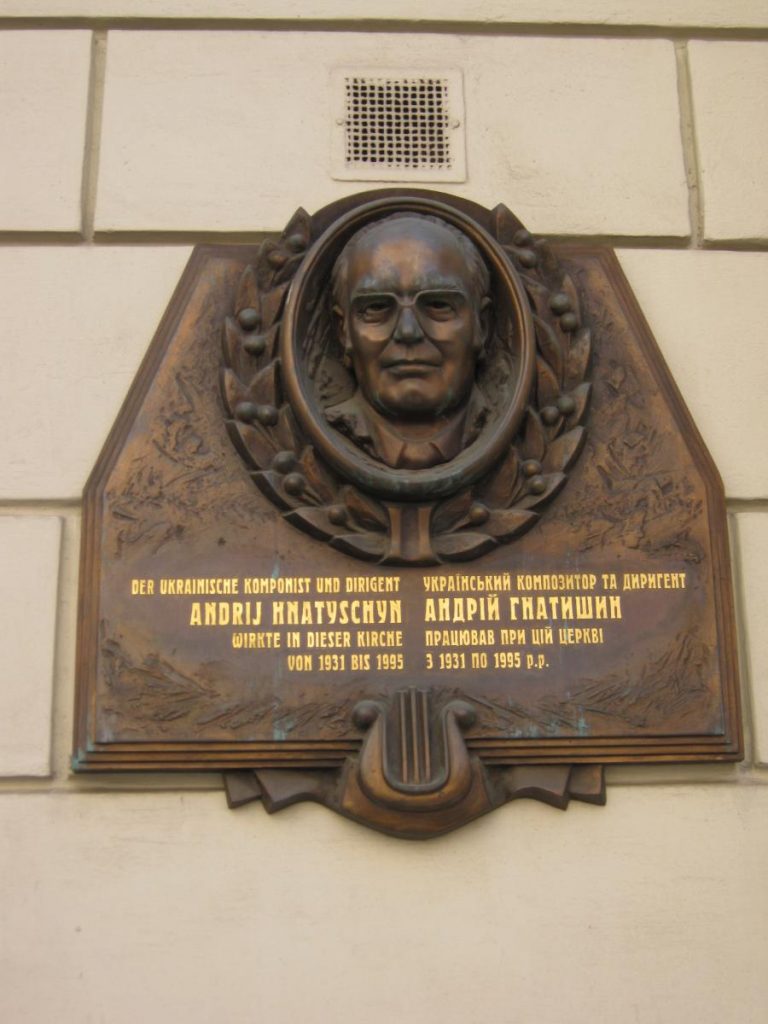
A memorial plaque to Andriy Hnatyshyn on the facade of the Church of St. Barbara in Vienna
Andriy Hnatyshyn – creative heritage
Andriy Hnatyshyn spent most of his life, 64 years, working with a church choir, so most of his compositions are sacred music. As a composer, Andriy Hnatyshyn created more than 260 pieces of church and secular music. One of the most famous:
– operas: “Олена” (eng. “Olena”) (1982), based on the story of the same name by Markiyan Shashkevych and “Бабусина пригода” (eng. “Grandma’s Adventure”) (1988), based on a fairy tale by Oleksandr Oles;
– suites: “Українська сюїта” (eng. “Ukrainian Suite”) for Symphony Orchestra (1936), “Моє село” (eng. “My Village”) (1945) and “Українські танці” (eng. “Ukrainian Dances”) (1949);
– cantatas: “Рука Івана Дамаскина” (eng. “The Hand of Ivan Damascene”) (1975) and “Хрещення України-Руси“ (eng. “The Baptism of Ukraine-Rus”) (1980);
– overture “Прощання Батьківщини” (eng. “Farewell to the Motherland”) (1948);
– string quartet;
– piano Trio and other works for piano, as well as for violin and cello;
– 15 liturgies;
– prayers to Prince Volodymyr the Equal-to-the-Apostles for mixed choir (1984), the Holy Virgin (1988), and Christ the Man-lover (1989);
– choruses to poems by Taras Shevchenko, Ivan Franko, and Oleksandr Oles;
– arrangements of Ukrainian folk songs.
He has also published several collections of Ukrainian songs for children and German-speaking choirs in Austrian music publishing houses.
The Ukrainian song “Жита” (eng. “Zhyta”) with lyrics by Oleksandr Oles is also famous. Andriy Hnatyshyn composed the music for it.
You can listen to the works of Andriy Hnatyshyn on the website parafia.org.ua.
Interesting Facts
Composer Andriy Hnatyshyn led the choir of the Ukrainian Greek Catholic St Barbara's in Vienna for 64 years, and thanks to him, the choir became one of the best choirs in Europe.
The brilliant composer Andriy Hnatyshyn contributed to the appearance of Ukrainian carols, church songs, hymns, and the broadcasting of the Ukrainian-language Holy Liturgy and Vespers on Austrian radio.
References:
- Andriy Hnatyshyn, Choir of the Church of St. BARBARIANS IN VIENNA. Andriy Hnatyshyn [Electronic resource]. – Available at: http://www. parafia. org. ua/person/hnatyshyn-andrij.
- Gamkalo I. D . Hnatyshyn Andriy Ilkovych // Encyclopedia of Modern Ukraine: electronic version [website] / ed. editors: I. M. Dziuba, A. I. Zhukovsky, M. G. Zheleznyak and others; National Academy of Sciences of Ukraine, National Technical School. Kyiv: Institute of Encyclopedic Studies of the National Academy of Sciences of Ukraine, 2006. URL: https://esu. com. ua/search_articles. php?id=30603.
- Goldak T. Peculiarities of Musical Life of Ukrainians in the Interregnum of the XIX – Early XX Centuries. Datsyuk S. Andriy Hnatyshyn – a prominent composer, conductor and public figure of the Ukrainian diaspora // Youth and the Market. – 2011. – №9. – pages: 51-55.
- Conductor and composer Andriy Hnatyshyn / ed. Vienna, 1994. – page 226
- Rudnytskyi A. Ukrainian music: a historical and critical review. – Munich, 1963. – page 406
- Sereda O. Hnatyshyn Andriy Ilkovych // Ukrainian journalism in names: materials for the encyclopedia. words. – Lviv, 2013. – Iss. 20. – pages 103-105.
- Dzvinka Vorobkalo. The Legend of the Ukrainian Music World, Zbruch, zbruc. eu, 26. 12. 2016.

